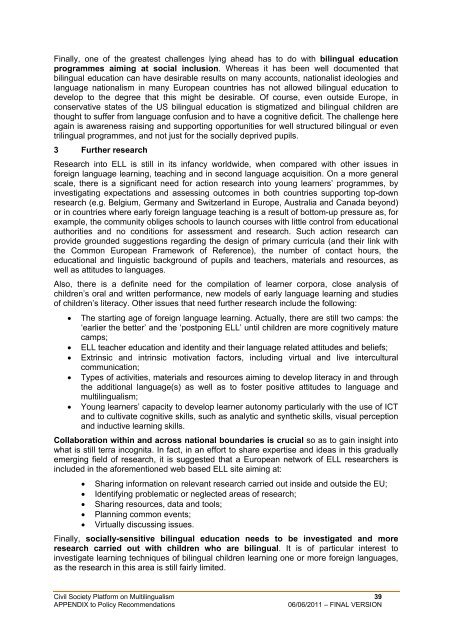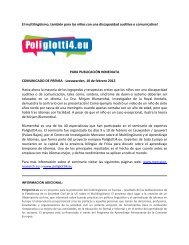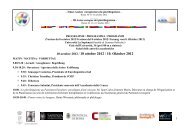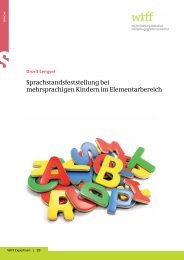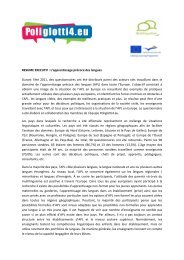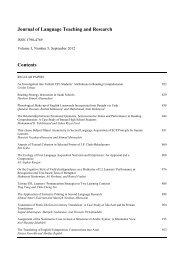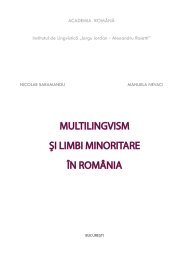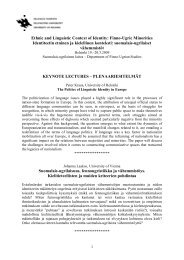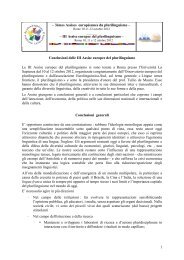meaningful for children of different ages, 30 and that the teacher has the qualifications to teachyoungsters. 31 However, there is relative shortage of foreign language teachers adequatelyprepared to teach young learners, and training them is a second but equally importantchallenge. A web based ELL site for pre-service and in-service teachers of youngchildren could be supported by the <strong>Commission</strong> and designed to disseminateinformation about interesting local initiatives and to provide an array of theoreticaland practical information, ideas for methods, practices and teaching techniques,language learning activities and resources for learners of different languages. Thelatter could be particularly useful since there also seems to be a lack of proper resources,especially so as to teach languages other than English to young children.One of the greatest challenges perhaps is to raise awareness with regard to the usefulnessof learning languages other than English at an early age. The stakeholders here are mainlyparents who want their children to be native-like in English, thinking that this will secure themacademically and professionally. Also pupils themselves are essential stakeholders whocould be extrinsically and intrinsically motivated to develop at least partial literacy inlanguages which are less widely spoken.As regards ELL methodology, most experts seem agree on the importance of focusing onmeaning rather than form, language use which is familiar and relevant to kids through a taskbased approach to learning. Also, there seems to be an agreement about including foreignlanguage instruction in the mainstream curriculum and using fun and creativity in theclassroom. However, the best way to deal with very young language learners, i.e. ages 3-7,when literacy in the mother tongue has not yet been developed, is still a challenge.Therefore, there is need for relevant research, which is discussed in the section thatfollows, but also pilot and experimental teaching experiences shared across Europe.Other challenges related to the teaching of foreign languages to youngsters have to do withthe educational approaches most conducive to the development of a multilingual ethos ofcommunication and to the meaningful use of the foreign language in parallel fashion with themother tongue. An equally important challenge is to specify techniques for the developmentof children’s mediation skills and their intercultural awareness from a very early age. Oncethese are recognized as important goals for the enhancement of multilingualism, the designof hands-on projects which might provide suggestions for teaching techniques,learning strategies and examples of good practice should be supported.One more challenge facing those who are concerned with ELL is to think more rigorouslyabout introducing opportunities for ELL with the use of ICT and web based technologies,particularly in languages other than English.It is also a challenge to consider ways of traditional assessment techniques for youngchildren, with the use of quizzes and fun testing (in an effort to create positive attitudes totesting and assessment), but also of alternative assessment, for example by using the<strong>European</strong> Language Portfolio, in an adapted form for children, so as to provide primaryschool pupils with a means of documenting what they can do in what language. Likewise, ifthese are recognized as important goals for the enhancement of multilingualism, the designof hands-on projects which might provide suggestions, relevant ideas and examplesof good practice should be supported.30Suitable programmes for 3-5 year olds will look different from programmes for 6-8 or 9-11 year olds.31It should be noted that there is another ongoing debate as to whether the classroom teacher should integrate the foreignlanguage period into his/her timetable, or whether a trained foreign language teacher should come in and teach the kids.Arguments evolve around the claims, on the one hand, that the classroom teacher has neither the language proficiency nor thetraining to teach a foreign language (which requires special methods and techniques) and, on the other, that the specialistteacher has no sound knowledge of child psychology and no training to employ the proper pedagogy. Some maintain that thisquestion is an invalid one, and argue that it should not be an “either-or” issue. Both are important. The challenging question ishow do you get them to collaborate?Civil Society Platform on Multilingualism 38APPENDIX to Policy Recommendations06/06/2011 – FINAL <strong>VERSION</strong>
Finally, one of the greatest challenges lying ahead has to do with bilingual educationprogrammes aiming at social inclusion. Whereas it has been well documented thatbilingual education can have desirable results on many accounts, nationalist ideologies andlanguage nationalism in many <strong>European</strong> countries has not allowed bilingual education todevelop to the degree that this might be desirable. Of course, even outside Europe, inconservative states of the US bilingual education is stigmatized and bilingual children arethought to suffer from language confusion and to have a cognitive deficit. The challenge hereagain is awareness raising and supporting opportunities for well structured bilingual or eventrilingual programmes, and not just for the socially deprived pupils.3 Further researchResearch into ELL is still in its infancy worldwide, when compared with other issues inforeign language learning, teaching and in second language acquisition. On a more generalscale, there is a significant need for action research into young learners’ programmes, byinvestigating expectations and assessing outcomes in both countries supporting top-downresearch (e.g. Belgium, Germany and Switzerland in Europe, Australia and Canada beyond)or in countries where early foreign language teaching is a result of bottom-up pressure as, forexample, the community obliges schools to launch courses with little control from educationalauthorities and no conditions for assessment and research. Such action research canprovide grounded suggestions regarding the design of primary curricula (and their link withthe Common <strong>European</strong> Framework of Reference), the number of contact hours, theeducational and linguistic background of pupils and teachers, materials and resources, aswell as attitudes to languages.Also, there is a definite need for the compilation of learner corpora, close analysis ofchildren’s oral and written performance, new models of early language learning and studiesof children’s literacy. Other issues that need further research include the following: The starting age of foreign language learning. Actually, there are still two camps: the‘earlier the better’ and the ‘postponing ELL’ until children are more cognitively maturecamps; ELL teacher education and identity and their language related attitudes and beliefs; Extrinsic and intrinsic motivation factors, including virtual and live interculturalcommunication; Types of activities, materials and resources aiming to develop literacy in and throughthe additional language(s) as well as to foster positive attitudes to language andmultilingualism; Young learners’ capacity to develop learner autonomy particularly with the use of ICTand to cultivate cognitive skills, such as analytic and synthetic skills, visual perceptionand inductive learning skills.Collaboration within and across national boundaries is crucial so as to gain insight intowhat is still terra incognita. In fact, in an effort to share expertise and ideas in this graduallyemerging field of research, it is suggested that a <strong>European</strong> network of ELL researchers isincluded in the aforementioned web based ELL site aiming at:Sharing information on relevant research carried out inside and outside the EU;Identifying problematic or neglected areas of research;Sharing resources, data and tools;Planning common events;Virtually discussing issues.Finally, socially-sensitive bilingual education needs to be investigated and moreresearch carried out with children who are bilingual. It is of particular interest toinvestigate learning techniques of bilingual children learning one or more foreign languages,as the research in this area is still fairly limited.Civil Society Platform on Multilingualism 39APPENDIX to Policy Recommendations06/06/2011 – FINAL <strong>VERSION</strong>


